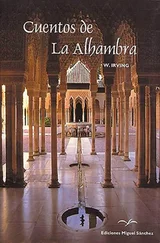1 ...6 7 8 10 11 12 ...46 In the time of the Moors the fortress was capable of containing within its outward precincts an army of forty thousand men, and served occasionally as a stronghold of the sovereigns against their rebellious subjects. After the kingdom had passed into the hands of the Christians, the Alhambra continued to be a royal demesne, and was occasionally inhabited by the Castilian monarchs. The emperor Charles V commenced a sumptuous palace within its walls, but was deterred from completing it by repeated shocks of earthquakes. The last royal residents were Philip V and his beautiful queen, Elizabetta of Parma, early in the eighteenth century. Great preparations were made for their reception. The palace and gardens were placed in a state of repair, and a new suite of apartments erected, and decorated by artists brought from Italy. The sojourn of the sovereigns was transient, and after their departure the palace once more became desolate. Still the place was maintained with some military state. The governor held it immediately from the crown, its jurisdiction extended down into the suburbs of the city, and was independent of the captain-general of Granada. A considerable garrison was kept up, the governor had his apartments in the front of the old Moorish palace, and never descended into Granada without some military parade. The fortress, in fact, was a little town of itself, having several streets of houses within its walls, together with a Franciscan convent and a parochial church.
The desertion of the court, however, was a fatal blow to the Alhambra. Its beautiful halls became desolate, and some of them fell to ruin; the gardens were destroyed, and the fountains ceased to play. By degrees the dwellings became filled with a loose and lawless population; contrabandistas, who availed themselves of its independent jurisdiction to carry on a wide and daring course of smuggling, and thieves and rogues of all sorts, who made this their place of refuge whence they might depredate upon Granada and its vicinity. The strong arm of government at length interfered; the whole community was thoroughly sifted; none were suffered to remain but such as were of honest character, and had legitimate right to a residence; the greater part of the houses were demolished and a mere hamlet left, with the parochial church and the Franciscan convent. During the recent troubles in Spain, when Granada was in the hands of the French, the Alhambra was garrisoned by their troops, and the palace was occasionally inhabited by the French commander. With that enlightened taste which has ever distinguished the French nation in their conquests, this monument of Moorish elegance and grandeur was rescued from the absolute ruin and desolation that were overwhelming it. The roofs were repaired, the saloons and galleries protected from the weather, the gardens cultivated, the watercourses restored, the fountains once more made to throw up their sparkling showers; and Spain may thank her invaders for having preserved to her the most beautiful and interesting of her historical monuments.
On the departure of the French they blew up several towers of the outer wall, and left the fortifications scarcely tenable. Since that time the military importance of the post is at an end. The garrison is a handful of invalid soldiers, whose principal duty is to guard some of the outer towers, which serve occasionally as a prison of state; and the governor, abandoning the lofty hill of the Alhambra, resides in the centre of Granada, for the more convenient dispatch of his official duties. I cannot conclude this brief notice of the state of the fortress without bearing testimony to the honorable exertions of its present commander, Don Francisco de Serna, who is tasking all the limited resources at his command to put the palace in a state of repair, and by his judicious precautions, has for some time arrested its too certain decay. Had his predecessors discharged the duties of their station with equal fidelity, the Alhambra might yet have remained in almost its pristine beauty: were government to second him with means equal to his zeal, this relic of it might still be preserved for many generations to adorn the land, and attract the curious and enlightened of every clime.
Our first object of course, on the morning after our arrival, was a visit to this time-honored edifice; it has been so often, however, and so minutely described by travellers, that I shall not undertake to give a comprehensive and elaborate account of it, but merely occasional sketches of parts with the incidents and associations connected with them.
Leaving our posada, and traversing the renowned square of the Vivarrambla, once the scene of Moorish jousts and tournaments, now a crowded marketplace, we proceeded along the Zacatin, the main street of what, in the time of the Moors, was the Great Bazaar, and where small shops and narrow alleys still retain the oriental character. Crossing an open place in front of the palace of the captain-general, we ascended a confined and winding street, the name of which reminded us of the chivalric days of Granada. It is called the Calle or street of the Gomeres, from a Moorish family famous in chronicle and song. This street led up to the Puerta de las Granadas, a massive gateway of Grecian architecture, built by Charles V, forming the entrance to the domains of the Alhambra.
At the gate were two or three ragged superannuated soldiers, dozing on a stone bench, the successors of the Zegris and the Abencerrages; while a tall, meagre varlet, whose rusty-brown cloak was evidently intended to conceal the ragged state of his nether garments, was lounging in the sunshine and gossiping with an ancient sentinel on duty. He joined us as we entered the gate, and offered his services to show us the fortress.
I have a traveller’s dislike to officious ciceroni, and did not altogether like the garb of the applicant.
“You are well acquainted with the place, I presume?”
“Ninguno mas; pues senor, soy hijo de la Alhambra.” — (“Nobody better; in fact, sir, I am a son of the Alhambra!”)
The common Spaniards have certainly a most poetical way of expressing themselves. “A son of the Alhambra!” — the appellation caught me at once; the very tattered garb of my new acquaintance assumed a dignity in my eyes. It was emblematic of the fortunes of the place, and befitted the progeny of a ruin.
I put some farther questions to him, and found that his title was legitimate. His family had lived in the fortress from generation to generation ever since the time of the conquest. His name was Mateo Ximenes. “Then, perhaps,” said I, “you may be a descendant from the great Cardinal Ximenes?”—”Dios sabe! God knows, senor! It may be so. We are the oldest family in the Alhambra — Cristianos viejos, old Christians, without any taint of Moor or Jew. I know we belong to some great family or other, but I forget whom. My father knows all about it: he has the coat-of-arms hanging up in his cottage, up in the fortress.” — There is not any Spaniard, however poor, but has some claim to high pedigree. The first title of this ragged worthy, however, had completely captivated me, so I gladly accepted the services of the “son of the Alhambra.”
We now found ourselves in a deep narrow ravine, filled with beautiful groves, with a steep avenue, and various footpaths winding through it, bordered with stone seats, and ornamented with fountains. To our left, we beheld the towers of the Alhambra beetling above us; to our right, on the opposite side of the ravine, we were equally dominated by rival towers on a rocky eminence. These, we were told, were the Torres Vermejos, or vermilion towers, so called from their ruddy hue. No one knows their origin. They are of a date much anterior to the Alhambra: some suppose them to have been built by the Romans; others, by some wandering colony of Phoenicians. Ascending the steep and shady avenue, we arrived at the foot of a huge square Moorish tower, forming a kind of barbican, through which passed the main entrance to the fortress. Within the barbican was another group of veteran invalids, one mounting guard at the portal, while the rest, wrapped in their tattered cloaks, slept on the stone benches. This portal is called the Gate of Justice, from the tribunal held within its porch during the Moslem domination, for the immediate trial of petty causes: a custom common to the oriental nations, and occasionally alluded to in the Sacred Scriptures. “Judge and officers shalt thou make thee in all thy gates, and they shall judge the people with just judgment.”
Читать дальше












